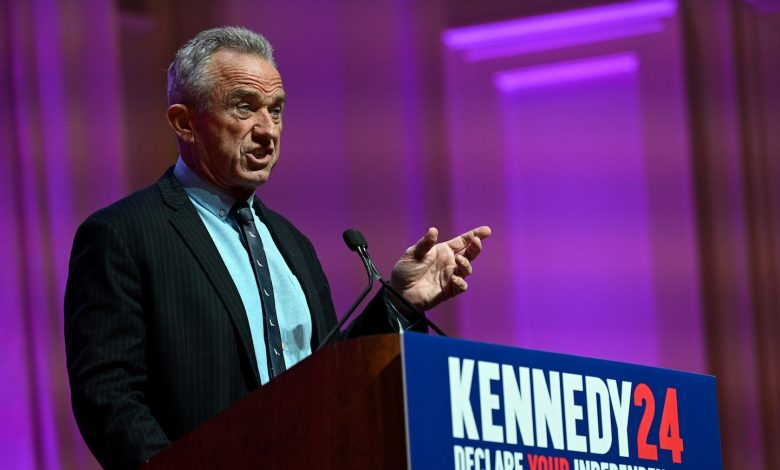RFK Jr.’s quintessential campaign position: The blockchain budget

The Government Publishing Office also offers a slew of budget documents, including presidents’ budget proposals (which are generally only implemented in piecemeal fashion). Or head over to USASpending.gov — a website maintained by the government — to review the budgets for individual government agencies.
It is true that you cannot see easily see line-item spending by government agencies. Given that the federal government spends (doing some quick math based on the OMB numbers) $220,000 a day, that would be hard to do.
Oh, sorry. Not per day. Per second.
Some of that is on things such as military aircraft, which are expensive. A lot of it, though, is on things like copy paper, which isn’t — except at the scale of the federal government. It’s easy to see, then, how cumbersome it is to review federal spending.
There are processes in place to do so, however. Standing House committees are tasked with oversight of federal departments. Whistleblowers are encouraged to come forward and report on potential wrongdoing. (Here’s the House Budget Committee’s page for whistleblower complaints, for example.) It’s an imperfect system, certainly, but it empowers the people closest to the spending — federal employees — to keep an eye on things even as it leverages the partisanship and desire for visibility of political actors.
Speaking at a rally over the weekend, though, independent presidential candidate Robert F. Kennedy Jr. had a different idea.
“We’re going to put the entire U.S. budget on the blockchain,” he said in Michigan, “so that every American can look at every budget item in the entire budget any time they want, 24 hours a day.”
“We’re going to have 300 million eyeballs on our budget,” he continued, “and if someone is spending $16,000 for a toilet seat, everybody’s going to know about it.”
This is a bad idea. It is also one that aligns so perfectly with Kennedy’s approach to politics that it’s hard to believe no one predicted this is where he would end up.
The blockchain — or more accurately here, a blockchain — is a distributed, public database. Think of it like a secure, shared Google spreadsheet to which you can only add new lines of information. Blockchains became popular alongside cryptocurrency, with transactions in bitcoin, for example, being recorded on such a database.
So why doesn’t this make sense for the federal budget? Well, first of all, it’s not really clear what the proposal is. Does Kennedy want to take budget information that’s already publicly available and put it on a blockchain? If so: okay? Feel free.
If, however, he wants to put every transaction on the blockchain, that’s far harder. It’s harder just as a function of scale, with the regional office of the Social Security Administration in Tallahassee now having to record its $250 Staples office supply purchase in a digital record. It’s also harder because the government spends lots of money on things that it doesn’t want to have public, for good reason — like counterintelligence efforts in foreign countries or the development of new weapons. A public blockchain entry of “Black Ops — Kyrgyzstan” would neither help Americans understand the government or help the government serve Americans.
None of this would dissuade Kennedy, certainly. It’s an idea that, first and foremost, implies that the federal government is too inept or corrupt to police itself and that average Americans would be better able to watchdog federal spending. It’s the sort of view of complex systems that might lead a person to think that established, proven vaccination programs are, in fact, suspect and that individual observers can reach better assessments of the safety and efficacy of vaccines than can doctors and scientists. You know, as Kennedy does.
The entire cryptocurrency industry is built, to some extent, on a similar skepticism, on a belief that governmental monetary systems are dubious and imperfect. Thanks to his credentials, Kennedy has been effective at appealing to the crypto community; his blockchain idea is an offshoot of that. (That cryptocurrency’s most well-established use case is “crime” does not appear to be a deterrent.)
The let-everyone-see-the-budget idea is just the federal government version of do-your-own-research, an understandable impulse in the modern era but an undeniably fraught one.
Back in 2009, Lawrence Lessig wrote an essay for the New Republic that offered prescient warnings about making public information broadly available.
“I fear that the inevitable success of this movement — if pursued alone, without any sensitivity to the full complexity of the idea of perfect openness — will inspire not reform, but disgust,” he wrote. “The ‘naked transparency movement,’ as I will call it here, is not going to inspire change. It will simply push any faith in our political system over the cliff.”
His expectation was that, given a giant pile of information, people would cherry-pick pieces to form narratives that might not reflect the truth and might be based on inaccurate assumptions. Think of the period after the 2020 election and the surfeit of nonsensical claims about election fraud that were rooted in misleading or misunderstood data points. Claims that were fundamentally about finding evidence that could be framed as bolstering a political position.
Now extrapolate that to the scale of the federal budget or to every single purchase made by the government. Since you’ve been reading this, the government’s spent millions of dollars. Did you find any pricey toilet seats in the mix? And even if you did, do you have the context for that spending, or is it just the combination of “expensive” and “funny” that some politicians find so appealing?
It is admittedly awkward to sit here as a journalist and make any sort of case against opening up the government’s books. The Washington Post would like to remind whistleblowers that they can also come to us, if they want, and that providing a line-item delineation of all government spending would be appreciated. The difference is that, for all of our admitted flaws, our reporters — like government representatives — have institutional checks in place aimed at accuracy and fairness. Three hundred million Americans (at least 38 million of whom would be under the age of 18, but whatever) eyeballing spending, many of them hoping to justify paying lower taxes, would have different motivations and guardrails.
But this is Robert F. Kennedy Jr., the guy whose entire candidacy is predicated on the idea that systems are less capable than individuals. And here we are.
Apsny News English
